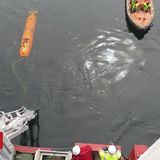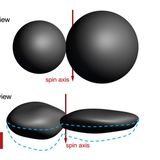RECENT ARTICLES

Antarctic iceberg: Giant 'white wanderer' poised to break free
Everybody is fascinated by icebergs. The idea that you can have blocks of frozen water the size of cities, and bigger, sparks our sense of wonder. British astronaut Tim Peake photographed one from orbit that would just about fit inside Central London's ring road. But at 26km by 13km (16 miles by 8 miles), it was a tiddler compared with the berg that is about to break away from the eastern side of the Antarctic Peninsula. A rift has grown across the edge of the Larsen C Ice Shelf. A thin, 5km-long section of the floating shelf is now all that prevents a 6,000-sq-km berg from drifting away...…Everybody is fascinated by icebergs. The idea that you can have blocks of frozen water the size of cities, and bigger, sparks our sense of wonder. British astronaut Tim Peake photographed one from orbit that would just about fit inside Central London's ring road. But at 26km by 13km (16 miles by 8 miles), it was a tiddler compared with the berg that is about to break away from the eastern side of the Antarctic Peninsula. A rift has grown across the edge of the Larsen C Ice Shelf. A thin, 5km-long section of the floating shelf is now all that prevents a 6,000-sq-km berg from drifting away...WW…

Big Antarctic iceberg edges out to sea
The giant berg A-68 looks finally to be on the move. Recent weeks have seen it shuffle back and forth next to the Antarctic ice shelf from which it broke away. But the latest satellite imagery now indicates the near-6,000 sq km block is swinging out into the Weddell Sea. A wide stretch of clear water has opened up between the berg's southern end and the remaining Larsen shelf structure, suggesting A-68 is set to swing around and head north. This is the direction the Weddell currents should take the iceberg. Polar experts expect the trillion-tonne block to essentially bump along the shelf...…The giant berg A-68 looks finally to be on the move. Recent weeks have seen it shuffle back and forth next to the Antarctic ice shelf from which it broke away. But the latest satellite imagery now indicates the near-6,000 sq km block is swinging out into the Weddell Sea. A wide stretch of clear water has opened up between the berg's southern end and the remaining Larsen shelf structure, suggesting A-68 is set to swing around and head north. This is the direction the Weddell currents should take the iceberg. Polar experts expect the trillion-tonne block to essentially bump along the shelf...WW…

SpaceX completes launch and landing double bill
US rocket company SpaceX completed back-to-back launches at the weekend. Late on Friday, it used one of its refurbished Falcon 9 vehicles to put up a Bulgarian satellite from Florida.Then on Sunday, SpaceX lofted another 10 spacecraft for telecommunications company Iridium. This time, the rocket flew out of California.Both missions saw the Falcon first-stages come back to Earth under control to drone ships that had been positioned out on the ocean. It means SpaceX has now had 13 landing successes for those missions it has sought to recover the booster. That said, Friday's first-stage had a...…US rocket company SpaceX completed back-to-back launches at the weekend. Late on Friday, it used one of its refurbished Falcon 9 vehicles to put up a Bulgarian satellite from Florida.Then on Sunday, SpaceX lofted another 10 spacecraft for telecommunications company Iridium. This time, the rocket flew out of California.Both missions saw the Falcon first-stages come back to Earth under control to drone ships that had been positioned out on the ocean. It means SpaceX has now had 13 landing successes for those missions it has sought to recover the booster. That said, Friday's first-stage had a...WW…

Climate change: 'Stunning' seafloor ridges record Antarctic retreat
Scientists are learning just how fast the ice margin of Antarctica can retreat in a warming world.They've identified features on the seafloor that indicate the ice edge was reversing at rates of up to 50m a day at the end of the last ice age.That's roughly 10 times faster than what's observed by satellites today.The discovery is important because it puts realistic constraints on the computer simulations that are used to project future change in the region."In numerical models, you play with the parameters - and they can do very strange things," said Prof Julian Dowdeswell. "But what these...…Scientists are learning just how fast the ice margin of Antarctica can retreat in a warming world.They've identified features on the seafloor that indicate the ice edge was reversing at rates of up to 50m a day at the end of the last ice age.That's roughly 10 times faster than what's observed by satellites today.The discovery is important because it puts realistic constraints on the computer simulations that are used to project future change in the region."In numerical models, you play with the parameters - and they can do very strange things," said Prof Julian Dowdeswell. "But what these...WW…

High microplastic concentration found on ocean floor
Scientists have identified the highest levels of microplastics ever recorded on the seafloor.The contamination was found in sediments pulled from the bottom of the Mediterranean, near Italy.The analysis, led by the University of Manchester, found up to 1.9 million plastic pieces per square metre.These items likely included fibres from clothing and other synthetic textiles, and tiny fragments from larger objects that had broken down over time.The researchers' investigations lead them to believe that microplastics (smaller than 1mm) are being concentrated in specific locations on the ocean...…Scientists have identified the highest levels of microplastics ever recorded on the seafloor.The contamination was found in sediments pulled from the bottom of the Mediterranean, near Italy.The analysis, led by the University of Manchester, found up to 1.9 million plastic pieces per square metre.These items likely included fibres from clothing and other synthetic textiles, and tiny fragments from larger objects that had broken down over time.The researchers' investigations lead them to believe that microplastics (smaller than 1mm) are being concentrated in specific locations on the ocean...WW…

Nasa's New Horizons: 'Space snowman' appears squashed
It seems the "space snowman" is more like a "gingerbread man".Scientists studying the distant object known as Ultima Thule are revising ideas about its shape after examining the latest images downlinked to Earth.The pictures, taken by the probe on 1 January, show the apparently bulbous body to be quite flat.This interpretation is evident from the data acquired by the Nasa spacecraft when it looked back at icy Ultima Thule as it zoomed past at 50,000km/h.‼️BREAKING‼️2014 MU69 (nicknamed ), is not, as it turns out, quite so round as initially anticipated. Images from confirm the highly...…It seems the "space snowman" is more like a "gingerbread man".Scientists studying the distant object known as Ultima Thule are revising ideas about its shape after examining the latest images downlinked to Earth.The pictures, taken by the probe on 1 January, show the apparently bulbous body to be quite flat.This interpretation is evident from the data acquired by the Nasa spacecraft when it looked back at icy Ultima Thule as it zoomed past at 50,000km/h.‼️BREAKING‼️2014 MU69 (nicknamed ), is not, as it turns out, quite so round as initially anticipated. Images from confirm the highly...WW…

Nasa Mars rover: Perseverance robot launches to detect life on Red Planet
The US space agency's Perseverance robot has left Earth on a mission to try to detect life on Mars.The one-tonne, six-wheeled rover was launched out of Florida by an Atlas rocket on a path to intercept the Red Planet in February next year.When it lands, the Nasa robot will also gather rock and soil samples to be sent home later this decade.Perseverance is the third mission despatched to Mars inside 11 days, after launches by the UAE and China. Lift-off from Cape Canaveral Air Force Station occurred at 07:50 local time (12:50 BST; 11:50 GMT).Nasa made this mission one of its absolute...…The US space agency's Perseverance robot has left Earth on a mission to try to detect life on Mars.The one-tonne, six-wheeled rover was launched out of Florida by an Atlas rocket on a path to intercept the Red Planet in February next year.When it lands, the Nasa robot will also gather rock and soil samples to be sent home later this decade.Perseverance is the third mission despatched to Mars inside 11 days, after launches by the UAE and China. Lift-off from Cape Canaveral Air Force Station occurred at 07:50 local time (12:50 BST; 11:50 GMT).Nasa made this mission one of its absolute...WW…

Hope probe: UAE launches historic first mission to Mars
The United Arab Emirates' historic first mission to Mars is under way, after a successful lift-off in Japan.The Hope probe launched on an H2-A rocket from Tanegashima spaceport, and is now on a 500-million-km journey to study the planet's weather and climate.Two previous attempts to launch the probe in the past week had to be called off because of adverse weather. Hope's arrival in February 2021 is set to coincide with the 50th anniversary of the UAE's formation.Her Excellency Sarah Al Amiri, the science lead on Hope, spoke of her excitement and relief in seeing the rocket climb...…The United Arab Emirates' historic first mission to Mars is under way, after a successful lift-off in Japan.The Hope probe launched on an H2-A rocket from Tanegashima spaceport, and is now on a 500-million-km journey to study the planet's weather and climate.Two previous attempts to launch the probe in the past week had to be called off because of adverse weather. Hope's arrival in February 2021 is set to coincide with the 50th anniversary of the UAE's formation.Her Excellency Sarah Al Amiri, the science lead on Hope, spoke of her excitement and relief in seeing the rocket climb...WW…

Wasp-76b: The exotic inferno planet where it 'rains iron'
Astronomers have observed a distant planet where it probably rains iron.It sounds like a science fiction movie, but this is the nature of some of the extreme worlds we're now discovering. Wasp-76b, as it's known, orbits so close in to its host star, its dayside temperatures exceed 2,400C - hot enough to vaporise metals.The planet's nightside, on the other hand, is 1,000 degrees cooler, allowing those metals to condense and rain out.It's a bizarre environment, according to Dr David Ehrenreich from the University of Geneva. "Imagine instead of a drizzle of water droplets, you have iron...…Astronomers have observed a distant planet where it probably rains iron.It sounds like a science fiction movie, but this is the nature of some of the extreme worlds we're now discovering. Wasp-76b, as it's known, orbits so close in to its host star, its dayside temperatures exceed 2,400C - hot enough to vaporise metals.The planet's nightside, on the other hand, is 1,000 degrees cooler, allowing those metals to condense and rain out.It's a bizarre environment, according to Dr David Ehrenreich from the University of Geneva. "Imagine instead of a drizzle of water droplets, you have iron...WW…

Desert telescope takes aim at ageing our Universe
Another telescope has entered the debate about the age and expansion rate of the Universe.This topic has recently become the subject of an energetic to and fro among scientists using different astronomical facilities and techniques.The new entrant is the Atacama Cosmology Telescope in Chile.It's been studying the "oldest light" on the sky and has concluded the Big Bang occurred 13.77 billion years ago, give or take 40 million years.That's almost exactly the same number we got from Europe's flagship Planck space observatory mission, which mapped the ancient light in the early 2010s.But...…Another telescope has entered the debate about the age and expansion rate of the Universe.This topic has recently become the subject of an energetic to and fro among scientists using different astronomical facilities and techniques.The new entrant is the Atacama Cosmology Telescope in Chile.It's been studying the "oldest light" on the sky and has concluded the Big Bang occurred 13.77 billion years ago, give or take 40 million years.That's almost exactly the same number we got from Europe's flagship Planck space observatory mission, which mapped the ancient light in the early 2010s.But...WW…